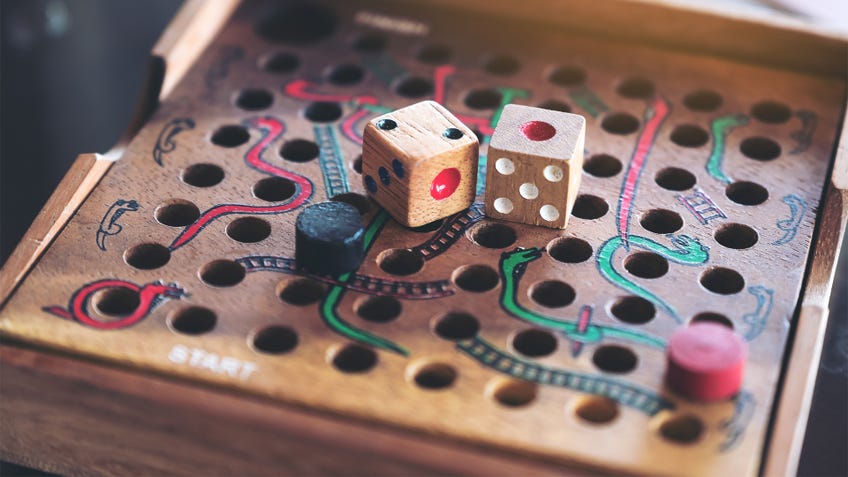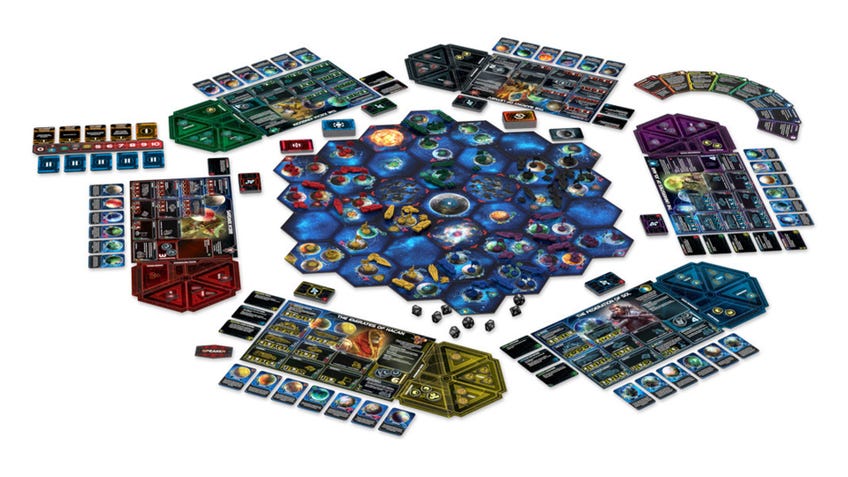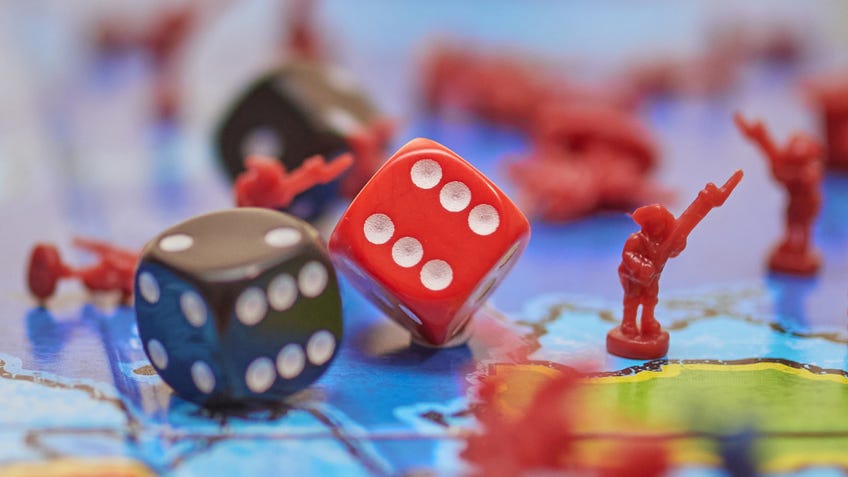Ameritrash is dead - long live Ameritrash
How two opposing styles of board game found harmony.
In a fit of pique, game designer Richard Hutnik seemingly minted the word ‘Ameritrash’. His forum posts on the topic, held in a digital archive, date back to 2000:
"Why is it, at [sic] a rule, they are bound to produced [sic] games run amok with randomness?... I know wargames are a general exception to this rule…. Think of the average game inventor in America. What is s/he trying to hawk? Either a luckfest game… or an abstract strategy game…. [The] “Ameritrash” mentality. (Ameritrash being my variant on the term "Eurotrash" that gets thrown around in some circles)."
This pique stuck with him. In 2011, he published W.W.B. (World’s Worst Boardgame) and encouraged everyone to rate it a 1 on BoardGameGeek. It consisted of 102 cards - two labelled ‘Start’ and ‘Finish,’ the rest numbered 1-100 - and a blank d6 with a ‘5’ taped to one side. Roll a 5 and your pawn moves up a number. Roll a second 5 and you don’t return to the start. Rinse and repeat.
In spite of Hutnik’s intentions, an ancestor could have found some higher meaning in this hate letter, and they might have sought the comfort of a priest afterward. Humans carved the first dice from bone, clay, antler, wood and any other material which came to hand. We produced them without regard to weight or shape because their results belonged to the gods.
Eventually, we standardised their forms and learned about loaded dice, but more out of instinct than understanding. We’re funny creatures. Long before germ theory, we traced a connection between dead animals in wells and disease.
As a species, we’ll never completely outgrow superstitions about dice. Even with a presumably above-average grasp of mathematics, some D&D players still “jail” their dice if they see enough unpleasant outcomes.

Anyone puzzled by the tenacity of “luckfests” like Left, Centre, Right or Snakes and Ladders needs to understand that they occupy a folkish space, enjoyed through agnosticism toward how many ways two dice can make a seven. Mathematicians only started charting probability and odds in the 16th century. Perceiving chance is a rite guarded by class and education.
The poster stars for Ameritrash are a halfway point between knucklebones and a king’s largesse.
Using it in games is a rare privilege, too. The historical wargame was the first to do so, and it was a gift from Prussian baron Georg von Reisswitz to King Wilhelm III. It could be called the world’s first deluxe Kickstarter edition: a table-cabinet with a six-by-six square battlefield, painted porcelain tiles moulded into mountains and valleys, and matching porcelain soldiers.
The luxury of this isn’t impressive in and of itself. Akbar the Great played Pachisi in a courtyard with slaves as his pieces, and there’s always the infamous story about the Mechanical Turk. No, a far more remarkable attribute is its thirst to simulate. Dice for combat. Rulers for movement. Rules for crossing terrain.

In this light, the poster stars for Ameritrash - our “luckfest” Risks and Axis and Allies and their tubs of plastic soldiers – represent something beautiful. They’re a democratisation of the form, a halfway point between knucklebones and a king’s largesse.
Hutnik spoke as an early American connoisseur of German family games, the ‘eurogame’. After WWII, Germany understandably had no patience for war or fate. They interrogated what we expected from games. Why must someone lose? Why must it always be a confrontation? Why must it always be about war or nothing at all?
We aren’t as omnivorous as we could or should be. Sometimes our tastes are almost courtly, constrained by style and blind to substance, context or composition.
When you challenge those assumptions, your themes soften. You simulate making post offices (Thurn und Taxis) or restaurants (Café International). You prefer comparing scores to domination. They called it Gesellschaftspiele, or ‘society games’.
Two fascinating traditions. I wish they would make peace.
For a while, it seemed like it happened. 17 years have passed since Fantasy Flight Games released the third edition of its dice-chuckin’ space opera Twilight Imperium. The second entry was essentially Axis and Allies in Space: Mega Edition. At the end of the rulebook for its third entry, creator Christian T. Petersen pens a love letter to Puerto Rico and the “German invasion”, explaining how he weaved it all together for his Ameritrash epic. If you want to see how well that panned out, you can buy its fourth edition for a princely £130.
But that flexibility in design doesn’t translate into equally flexible gamers. Wood or plastic? Dice or cards? Lots of randomness or little? Can you vivisect an artform like this? I expect some future historian to identify a cardboard equivalent of the Devil’s Interval. We aren’t as omnivorous as we could or should be. Sometimes our tastes are almost courtly, constrained by style and blind to substance, context or composition.

Perhaps we can agree, however, on where we don’t want to go.
Monopoly is still a lodestar. People universally invoke it to mention The Way Games Used to Be, implying that they should never be made that way again. Its worldview is black and white, zero-sum. It reduces life to destiny and rags-to-riches-to-rags stories.
Thanks to Ameritrash, we know there’s more to luck than fate. Thanks to eurogames, we know that competition comes in all manner of hues, from Wingspan’s breezy blue to Kemet’s white-hot red. It’s a vision of what was and the tug of what may be.


